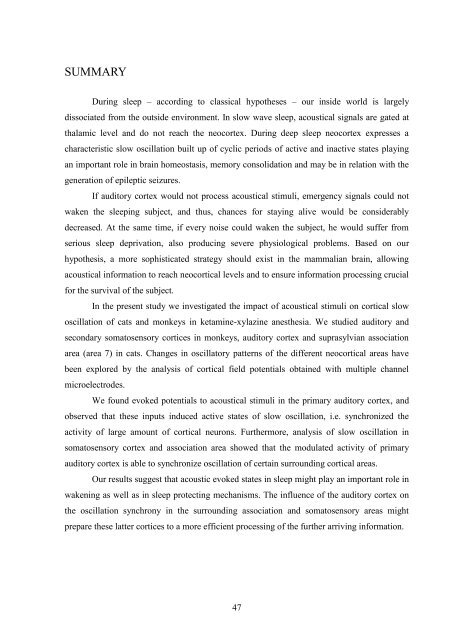az akusztikus ingerek hatása a lassú alvási oszcillációra - Kutatás
az akusztikus ingerek hatása a lassú alvási oszcillációra - Kutatás
az akusztikus ingerek hatása a lassú alvási oszcillációra - Kutatás
Create successful ePaper yourself
Turn your PDF publications into a flip-book with our unique Google optimized e-Paper software.
SUMMARY<br />
During sleep – according to classical hypotheses – our inside world is largely<br />
dissociated from the outside environment. In slow wave sleep, acoustical signals are gated at<br />
thalamic level and do not reach the neocortex. During deep sleep neocortex expresses a<br />
characteristic slow oscillation built up of cyclic periods of active and inactive states playing<br />
an important role in brain homeostasis, memory consolidation and may be in relation with the<br />
generation of epileptic seizures.<br />
If auditory cortex would not process acoustical stimuli, emergency signals could not<br />
waken the sleeping subject, and thus, chances for staying alive would be considerably<br />
decreased. At the same time, if every noise could waken the subject, he would suffer from<br />
serious sleep deprivation, also producing severe physiological problems. Based on our<br />
hypothesis, a more sophisticated strategy should exist in the mammalian brain, allowing<br />
acoustical information to reach neocortical levels and to ensure information processing crucial<br />
for the survival of the subject.<br />
In the present study we investigated the impact of acoustical stimuli on cortical slow<br />
oscillation of cats and monkeys in ketamine-xyl<strong>az</strong>ine anesthesia. We studied auditory and<br />
secondary somatosensory cortices in monkeys, auditory cortex and suprasylvian association<br />
area (area 7) in cats. Changes in oscillatory patterns of the different neocortical areas have<br />
been explored by the analysis of cortical field potentials obtained with multiple channel<br />
microelectrodes.<br />
We found evoked potentials to acoustical stimuli in the primary auditory cortex, and<br />
observed that these inputs induced active states of slow oscillation, i.e. synchronized the<br />
activity of large amount of cortical neurons. Furthermore, analysis of slow oscillation in<br />
somatosensory cortex and association area showed that the modulated activity of primary<br />
auditory cortex is able to synchronize oscillation of certain surrounding cortical areas.<br />
Our results suggest that acoustic evoked states in sleep might play an important role in<br />
wakening as well as in sleep protecting mechanisms. The influence of the auditory cortex on<br />
the oscillation synchrony in the surrounding association and somatosensory areas might<br />
prepare these latter cortices to a more efficient processing of the further arriving information.<br />
47


